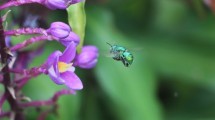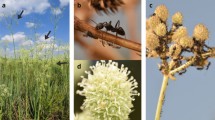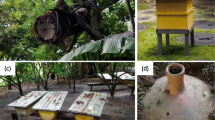Abstract
Nectar robbery is usually thought to impact negatively on the reproductive success of plants, but also neutral or even positive effects have been reported. Very few studies have investigated the effects of nectar robbing on the behaviour of legitimate pollinators so far. Such behavioural changes may lead to the reduction of geitonogamy or to increased pollen movement. We simulated nectar robbing in experimental sites as well as in natural populations of Aconitum napellus ssp. lusitanicum, a rare plant pollinated by long-tongued bumblebees. In an experimental setup, we removed the nectaries of 40 % of the flowers, which is similar to rates of robbing observed in wild populations. Patches of plants with experimentally robbed flowers were compared with control patches containing plants with untreated flowers. We observed pollinator behaviour, mimicked male reproductive success (pollen dispersal) using fluorescent dye, and measured female reproductive success (seed set). The main legitimate visitors were bumblebees while honeybees were often observed robbing nectar. They did so by “base working”, i.e. sliding between tepals. Bumblebees tended to visit fewer flowers per plant and spent less time per single flower when these had been experimentally robbed. This change in behaviour consequently increased the proportion of flowers visited by bumblebees in patches with robbed flowers. Fluorescent dye mimicking pollen flow was dispersed larger distances after pollinators had visited patches with robbed flowers compared to control patches. Average seed set per plant was not affected by nectar robbing. Our results demonstrated that A. napellus does not suffer from nectar robbery but may rather benefit via improved pollen dispersal and thus, male reproductive success. Knowledge on such combined effects of behavioural changes of pollinators due to nectar robbery is important to understand the evolutionary significance of exploiters of such mutualistic relationships between plants and their pollinators.


Similar content being viewed by others
References
Adler LS (2000) The ecological significance of toxic nectar. Oikos 91:409–420. doi:10.1034/j.1600-0706.2000.910301.x
Adler LS, Irwin RE (2005) Ecological costs and benefits of defenses in nectar. Ecology 86:2968–2978. doi:10.1890/05-0118
Barrett SCH (2003) Mating strategies in flowering plants: the outcrossing–selfing paradigm and beyond. Philos Trans R Soc Lond B Biol Sci 358:991–1004. doi:10.1098/rstb.2003.1301
Barrett SCH, Harder LD (1996) Ecology and evolution of plant mating. Trends Ecol Evol 11:73–79. doi:10.1016/0169-5347(96)81046-9
Brody AK, Irwin RE, McCutcheon ML, Parsons EC (2008) Interactions between nectar robbers and seed predators mediated by a shared host plant, Ipomopsis aggregata. Oecologia 155:75–84. doi:10.1007/s00442-007-0879-8
Bronstein JL (2001) The costs of mutualism. Am Zool 41:825–839. doi:10.2307/3884527
Burkle LA, Irwin RE, Newman DA (2007) Predicting the effects of nectar robbing on plant reproduction: implications of pollen limitation and plant mating system. Am J Bot 94:1935–1943. doi:10.3732/ajb.94.12.1935
Campagne P, Affre L, Baumel A et al (2009) Fine-scale response to landscape structure in Primula vulgaris Huds.: does hedgerow network connectedness ensure connectivity through gene flow? Popul Ecol 51:209–219. doi:10.1007/s10144-008-0124-2
Castro S, Silveira P, Navarro L (2008) Consequences of nectar robbing for the fitness of a threatened plant species. Plant Ecol 199:201–208. doi:10.1007/s11258-008-9424-z
Cawoy V, Jonard M, Mayer C, Jacquemart A-L (2012) Do abundance and proximity of the alien Impatiens glandulifera affect pollination and reproductive success of two sympatric co-flowering native species? J Pollinat Ecol 10:130–139. http://www.pollinationecology.org/index.php?journal=jpe&page=article&op=view&path[]=203
Darwin C (1872) Effects of cross and self fertilisation in the vegetable kingdom. Murray, London
Dedej S, Delaplane KS (2005) Net energetic advantage drives honey bees (Apis mellifera L.) to nectar larceny in Vaccinium ashei Reade. Behav Ecol Sociobiol 57:398–403. doi:10.1007/s00265-004-0852-z
Dehon C (2011) Etude de l’impact du vol de nectar sur Aconitum napellus spp. lusitanicum et sur le comportement de ses pollinisateurs. Master thesis, Université catholique de Louvain
Delaplane KS, Mayer DF (2000) Crop pollination by bees. CABI, New York
Dohzono I, Kunitake YK, Yokoyama J, Goka K (2008) Alien bumble bee affects native plant reproduction through interactions with native bumble bees. Ecology 89:3082–3092. doi:10.1890/07-1491.1
Fenster CB (1991) Gene flow in Chamaecrista fasciculata (Leguminosae) I. Gene dispersal. Evolution 45:398–409. doi:10.2307/2409673
Ferrari S, Cribari-Neto F (2004) Beta regression for modelling rates and proportions. J Appl Statist 31:799–815. doi:10.1080/0266476042000214501
Galen C, Plowright RC (1985) The effects of nectar level and flower development on pollen carry-over in inflorescences of fireweed (Epilobium angustifolium) (Onagraceae). Can J Bot 63:488–491. doi:10.1139/b85-060
González-Gómez PL, Valdivia CE (2005) Direct and indirect effects of nectar robbing on the pollinating behavior of Patagona gigas (Trochilidae). Biotropica 37:693–696. doi:10.1111/j.1744-7429.2005.00088.x
Gosselin M, Michez D, Vanderplanck M et al (2013) Does Aconitum septentrionale chemically protect floral rewards to the advantage of specialist bumblebees? Ecol Entomol 38:400–407. doi:10.1111/een.12032
Goulson D, Hawson SA, Stout JC (1998) Foraging bumblebees avoid flowers already visited by conspecifics or by other bumblebee species. Anim Behav 55:199–206. doi:10.1006/anbe.1997.0570
Harder LD, Barrett SCH (1995) Mating cost of large floral displays in hermaphrodite plants. Nature 373:512–515. doi:10.1038/373512a0
Hardy OJ, González-Martínez SC, Fréville H et al (2004) Fine-scale genetic structure and gene dispersal in Centaurea corymbosa (Asteraceae) I. Pattern of pollen dispersal. J Evol Biol 17:795–806. doi:10.1111/j.1420-9101.2004.00713.x
Heinrich B (1979) Resource heterogeneity and patterns of movement in foraging bumblebees. Oecologia 40:235–245. doi:10.1007/BF00345321
Inouye DW (1980) The terminology of floral larceny. Ecology 61:1251–1253. doi:10.2307/1936841
Irwin RE (2003) Impact of nectar robbing on estimates of pollen flow: conceptual predictions and empirical outcomes. Ecology 84:485–495. doi:10.1890/0012-9658(2003)084[0485:IONROE]2.0.CO;2
Irwin RE, Adler LS (2006) Correlations among traits associated with herbivore resistance and pollination: implications for pollination and nectar robbing in a distylous plant. Am J Bot 93:64–72. doi:10.3732/ajb.93.1.64
Irwin RE, Brody AK (1998) Nectar robbing in Ipomopsis aggregata: effects on pollinator behavior and plant fitness. Oecologia 116:519–527. doi:10.1007/s004420050617
Irwin R, Maloof J (2002) Variation in nectar robbing over time, space, and species. Oecologia 133:525–533. doi:10.1007/s00442-002-1060-z
Irwin RE, Galen C, Rabenold JJ et al (2008) Mechanisms of tolerance to floral larceny in two wildflower species. Ecology 89:3093–3104. doi:10.1890/08-0081.1
Irwin RE, Bronstein JL, Manson JS, Richardson L (2010) Nectar robbing: ecological and evolutionary perspectives. Annu Rev Ecol Evol Syst 41:271–292. doi:10.1146/annurev.ecolsys.110308.120330
Jersáková J, Johnson SD, Kindlmann P (2006) Mechanisms and evolution of deceptive pollination in orchids. Biol Rev Camb Philos Soc 81:219–235. doi:10.1017/S1464793105006986
Kearns CA, Inouye DW (1993) Techniques for pollination biologists. University Press of Colorado, Niwot
Lambinon J, Verloove F (2012) Nouvelle Flore de la Belgique, du Grand-Duché de Luxembourg, du Nord de la France et des Régions voisines, 6th edn. Jardin botanique national de Belgique, Meise
Le Cadre S (2005) Allee effects on plants. The case of Aconitum napellus subsp. lusitanicum. PhD Thesis, Université Pierre et Marie Curie (Paris VI)
Le Cadre S, Tully T, Mazer SJ et al (2008) Allee effects within small populations of Aconitum napellus ssp. lusitanicum, a protected subspecies in northern France. New Phytol 179:1171–1182. doi:10.1111/j.1469-8137.2008.02529.x
Leadbeater E, Chittka L (2008) Social transmission of nectar-robbing behaviour in bumble-bees. Proc R Soc B 275:1669–1674. doi:10.1098/rspb.2008.0270
Maloof JE (2001) The effects of a bumble bee nectar robber on plant reproductive success and pollinator behavior. Am J Bot 88:1960–1965
Maloof JE, Inouye DW (2000) Are nectar robbers cheaters or mutualists? Ecology 81:2651–2661. doi:10.1890/0012-9658(2000)081[2651:ANRCOM]2.0.CO;2
Mayer C, Van Rossum F, Jacquemart A-L (2012) Evaluating pollen flow indicators for an insect-pollinated plant species. Basic Appl Ecol 13:690–697. doi:10.1016/j.baae.2012.09.012
Mitchell RJ (1993) Adaptive significance of Ipomopsis aggregata nectar production: observation and experiment in the field. Evolution 47:25–35. doi:10.2307/2410115
Morris WF (1996) Mutualism denied? Nectar-robbing bumble bees do not reduce female or male success of bluebells. Ecology 77:1451–1462. doi:10.2307/2265542
Navarro L (2000) Pollination ecology of Anthyllis vulneraria subsp. vulgaris (Fabaceae): nectar robbers as pollinators. Am J Bot 87:980–985
Navarro L (2001) Reproductive biology and effect of nectar robbing on fruit production in Macleania bullata (Ericaceae). Plant Ecol 152:59–65. doi:10.1023/A:1011463520398
Naveau O (2012) Etude de l’impact du vol de nectar sur Aconitum napellus spp. lusitanicum et sur le comportement de ses pollinisateurs. Master thesis, Université catholique de Louvain
Newman DA, Thomson JD (2005) Interactions among nectar robbing, floral herbivory, and ant protection in Linaria vulgaris. Oikos 110:497–506. doi:10.1111/j.0030-1299.2005.13885.x
Proctor M, Yeo P, Lack A (1996) The natural history of pollination. Harper Collins Publishers (The New Naturalist), London
Pyke GH (1984) Optimal foraging theory: a critical review. Annu Rev Ecol Syst 15:523–575. doi:10.1146/annurev.es.15.110184.002515
R Development Core Team (2009) R: a language and environment for statistical computing. R Foundation for Statistical Computing, Vienna
Richardson S (2004) Are nectar-robbers mutualists or antagonists? Oecologia 139:246–254. doi:10.1007/s00442-004-1504-8
Richardson L, Bronstein JL (2012) Reproductive biology of pointleaf manzanita (Arctostaphylos pungens) and the pollinator-nectar robber spectrum. J Pollinat Ecol 9:115–123. http://www.pollinationecology.org/index.php?journal=jpe&page=article&op=view&path[]=177
Rigo C (2013) Etude de l’impact du vol de nectar sur Aconitum napellus spp. lusitanicum et sur le comportement de ses pollinisateurs. Master thesis, Université catholique de Louvain
Roubik DW (1982) The ecological impact of nectar-robbing bees and pollinating hummingbirds on a tropical shrub. Ecology 63:354–360. doi:10.2307/1938953
Rust RW (1979) Pollination of Impatiens capensis: pollinators and nectar robbers. J Kansas Entomol Soc 52:297–308. doi:10.2307/25083907
Schiestl FP (2005) On the success of a swindle: pollination by deception in orchids. Naturwissenschaften 92:255–264. doi:10.1007/s00114-005-0636-y
Sokal RR, Rohlf FJ (2000) Biometry: the principles and practices of statistics in biological research, 3rd edn. Freeman and Company, New York
Stout JC, Allen JA, Goulson D (2000) Nectar robbing, forager efficiency and seed set: bumblebees foraging on the self incompatible plant Linaria vulgaris (Scrophulariaceae). Acta Oecol 21:277–283. doi:10.1016/S1146-609X(00)01085-7
Thomson JD (1986) Pollen transport and deposition by bumble bees in Erythronium: influences of floral nectar and bee grooming. J Ecol 74:329–341. doi:10.2307/2260258
Thomson JD, Plowright RC (1980) Pollen carryover, nectar rewards, and pollinator behavior with special reference to Diervilla lonicera. Oecologia 46:68–74. doi:10.1007/BF00346968
Torvik SE, Borgen L, Berg RY (1998) Aspects of reproduction in Pulsatilla pratensis in Norway. Nord J Bot 18:385–391. doi:10.1111/j.1756-1051.1998.tb01515.x
Townsend PA, Levey DJ (2005) An experimental test of whether habitat corridors affect pollen transfer. Ecology 86:466–475. doi:10.1890/03-0607
Traveset A, Willson MF, Sabag C (1998) Effect of nectar-robbing birds on fruit set of Fuchsia magellanica in Tierra Del Fuego: a disrupted mutualism. Funct Ecol 12:459–464. doi:10.1046/j.1365-2435.1998.00212.x
Van Geert A, Van Rossum F, Triest L (2010) Do linear landscape elements in farmland act as biological corridors for pollen dispersal? J Ecol 98:178–187. doi:10.1111/j.1365-2745.2009.01600.x
Van Rossum F (2010) Reproductive success and pollen dispersal in urban populations of an insect-pollinated hay-meadow herb. Perspect Plant Ecol 12:21–29. doi:10.1016/j.ppees.2009.08.002
Van Rossum F, Stiers I, Van Geert A et al (2011) Fluorescent dye particles as pollen analogues for measuring pollen dispersal in an insect-pollinated forest herb. Oecologia 165:663–674. doi:10.1007/s00442-010-1745-7Waser
Waser NM (1988) Comparative pollen and dye transfer by pollinators of Delphinium nelsonii. Funct Ecol 2:41–48. doi:10.2307/2389458
Weaver N (1956) The foraging behavior of honeybees on hairy vetch foraging methods and learning to forage. Insectes Soc 3:537–549. doi:10.1007/BF02226457
Williams GS (1998) The identity of the previous visitor influences flower rejection by nectar-collecting bees. Anim Behav 56:673–681. doi:10.1006/anbe.1998.0794
Zhang Y-W, Robert GW, Wang Y, Guo Y-H (2007) Nectar robbing of a carpenter bee and its effects on the reproductive fitness of Glechoma longituba (Lamiaceae). Plant Ecol 193:1–13. doi:10.1007/s11258-006-9244-y
Zimmerman M, Cook S (1985) Pollinator foraging, experimental nectar-robbing and plant fitness in Impatiens capensis. Am Midl Nat 113:84–91. doi:10.2307/2425350
Acknowledgments
We would like to thank the “Département de la Nature et des Forêts”, Yves Storder and “Natagora” for the permission to study A. napellus ssp. lusitanicum populations in nature reserves during 2010–2012 and collect plant fragments in large and un-endangered populations in 2008 (ref. DNF/DN/PB/SLI/MLB/802.7). Renate Wesselingh (UCL) kindly provided fluorescent dyes. Fabienne Van Rossum made comments on an earlier version of the manuscript. Thanks go to Connal Eardley for language improvement. The study was conducted in accordance with current Belgian laws.
Author information
Authors and Affiliations
Corresponding author
Appendix
Appendix
See Table 3.
Rights and permissions
About this article
Cite this article
Mayer, C., Dehon, C., Gauthier, AL. et al. Nectar robbing improves male reproductive success of the endangered Aconitum napellus ssp. lusitanicum . Evol Ecol 28, 669–685 (2014). https://doi.org/10.1007/s10682-014-9696-9
Received:
Accepted:
Published:
Issue Date:
DOI: https://doi.org/10.1007/s10682-014-9696-9




